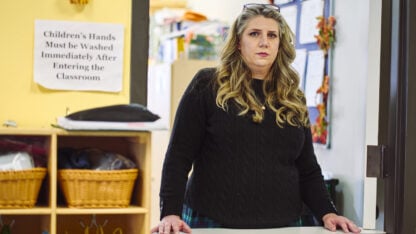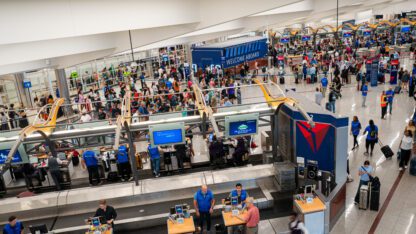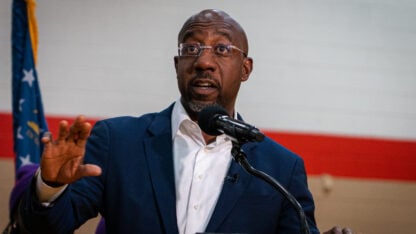After months of partisan stand off on Capitol Hill over the size and composition of another round of coronavirus relief, key signs of progress emerged as the House and Senate moved closer to a possible deal.
House Speaker Nancy Pelosi, D-Calif., and Senate Majority Leader Mitch McConnell, R-Ky., spoke by telephone Thursday afternoon — notable because the two top leaders hadn’t spoken about legislation addressing the pandemic since the election. Up until Thursday they had been blaming at each other in press conferences and floor speeches for the lack of action.
While the two sides are getting closer in terms of the possible size of a package, key policy differences over liability protections and whether to help state and local governments continue to be the chief hang ups. The time pressure is also working against members, as pulling together a measure costing hundreds of billions of dollars in a matter of days is colliding with efforts to finalize a massive government funding bill.
The scramble comes as millions of Americans face losing support programs at the end of the month and cases and hospitalizations are surging across the country. Top leaders are aiming to finish business for the year at the end of next week.
McConnell, who rarely comments in the hallways, told reporters that he discussed a broader spending bill and the relief measure with Pelosi, and said, “well we had a good conversation. I think we’re both interested in getting an outcome, both on the omnibus and on a coronavirus package.”
The ramped up negotiations come a day after Pelosi and Senate Minority Leader Chuck Schumer backed off their demands for a roughly $2 trillion COVID-19 response bill and said they were now supporting a bipartisan $908 billion framework proposed by a group of House and Senate centrist lawmakers as the basis for talks.
That proposal includes more money for the popular Paycheck Protection Program which provides loans for small businesses, resources for state and local governments, help for unemployed Americans, and money for vaccine distribution.
McConnell, who earlier this week pushed his own, roughly $500 billion plan, acknowledged the two sides were moving towards each other, saying on the Senate floor, “compromise is within reach. We know where we agree. We can do this.”
Beyond the direct communication between the two top leaders, rank and file lawmakers from both parties signaled they were willing to compromise on several elements that had become sticking points for months.
McConnell and most Senate Republicans have insisted that any new relief bill include fairly broad legal protections for businesses and schools. The bipartisan proposal included a provision that temporarily blocks lawsuits until states can enact their own laws.
Texas GOP Sen. John Cornyn, who had championed liability language as essential, told reporters he was looking at the proposal from the moderate bill, and said, “I think there’s almost always more than one way to accomplish the same goal and so that’s what we’re trying to.”
Many Republicans have also pushed back at providing any money for state and local governments, but Iowa GOP Sen. Chuck Grassley suggested he could stomach some — with a limit. He said “if the figure’s over 150 [billion], I won’t like it.”
South Carolina Republican Sen. Lindsey Graham, a key ally of President Trump’s, said he spoke to the president about the bipartisan plan during a visit to the White House on Thursday. Graham said he told him that McConnell’s plan doesn’t have bipartisan support. And Graham noted he’s tired of “show votes,” and the bipartisan plan “will really help people.”
“I’ve never been more hopeful that we’ll get a bill,” Graham said, noting that he’s also on board with the plan. “There’s a deal to be had. The president wants to deal. So I’m fairly encouraged.”
The president has been absent from the discussions and has left talks to White House Chief of Staff Mark Meadows and Treasury Secretary Steven Mnuchin, but he told reporters Thursday he would support a plan that emerges. “I believe they’re getting close to a deal.”
In an interview with CNN that aired Thursday night, President-elect Joe Biden said the deal is a “good start,” and that he’ll likely come back to ask for more relief aid once he’s in office.
Utah Republican Sen. Mitt Romney, who was part of the bipartisan group drafting the $908 billion plan, joined some other GOP supporters in a meeting with McConnell to go over their proposal and said afterwards, “we’re getting more and more support from Republicans and Democrats.”
Grassley admitted the size of what was being discussed was a little high, but appeared open to backing more money, adding, “more important for me is the things that are in it. And if there’s things that — if everything in it has some bipartisan support, like we’ve been saying for six weeks, the figure might not be the biggest thing.”
Similarly, North Dakota GOP Sen. Kevin Cramer, whose home state is experiencing a spike in cases, told reporters, “I like the effort. It strikes the right balance of compromise and it’s a number that’s doable.”
Copyright 2020 NPR. To see more, visit https://www.npr.org.
9(MDAxODM0MDY4MDEyMTY4NDA3MzI3YjkzMw004))
9(MDAxODM0MDY4MDEyMTY4NDA3MzI3YjkzMw004))







